Recent Entries
Wajir Women Rep Fatuma Abdi Jehow
July 12, 2025
“...hata kama hatutakua na votes, tutamwibia, hiyo si
siri”
“...hata kama hatutakua na votes, tutamwibia, hiyo si siri”
tbc
The statement by Wajir Woman Representative, declaring that "we
must rig the election for William Ruto in 2027," reflects open
contempt for the democratic will of the people. Such blatant
disregard for free and fair elections undermines the
constitution and the very foundation of representative
governance. It reveals a dangerous willingness to subvert public
choice for political gain, deepening public mistrust and eroding
Kenya’s fragile democratic institutions.
Source
Aden Duale (CS), Nelson Koech (MP)
July 9, 2025
“Shoot and kill”
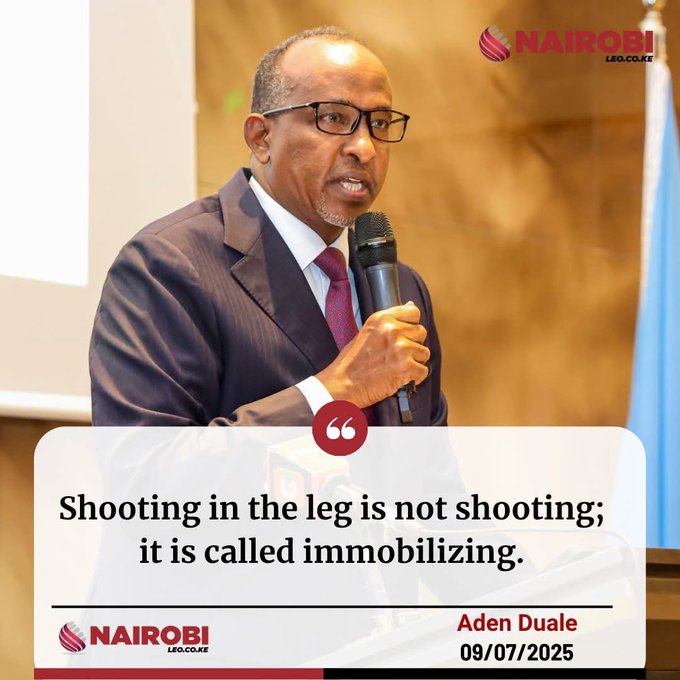
“Shoot and kill."
various
The statements by MP Nelson Koech and CS Aden Duale, calling for
certain Kenyans to be shot, reflect a dangerous level of
contempt for the people they are meant to serve. Such remarks
reveal an authoritarian mindset and a complete disregard for
democratic principles and human rights. When leaders openly
advocate violence against citizens, it signals a deep hostility
toward criticism and dissent. This is not just reckless
rhetoric—it is a threat to civil liberties and public safety.
Kenyans deserve leaders who uphold the law, not those who use
fear to silence opposition.
Source
President William Ruto
July 9, 2025
“Wapige risasi miguu aende hospitali akienda kotini.
President Ruto gives the Police permission to shoot”
“Wapige risasi miguu aende hospitali akienda kotini."
Police Housing Project, Kilimani, Nairobi
In the context of President Ruto’s statement authorizing police
to "shoot people in the legs so they can go to hospital as they
go to court," and considering the tragic case of Rex Masai — the
first victim of the June 25th protest who was shot in the leg
and bled to death — the statement translates into a deeply
chilling message. It suggests a normalization of state violence
under the guise of law enforcement, where injury is presented as
a measured, even humane tactic, despite the fatal consequences
already witnessed. Rather than de-escalation or protection of
life, the directive implies that wounding citizens is an
acceptable strategy for crowd control or punishment,
disregarding the real risk of death. In this light, the
president’s words can be seen as a grim rationalization of
brutality — a signal that the state is willing to harm its
citizens to assert control, even as it couches that harm in
clinical or procedural language.
Source
President William Ruto
July 7, 2025
“...and if there is no country for me, there is no country
for you.”
“...and if there is no country for me, there is no country for
you."
tbc
When President William Ruto declares, *"If there's no country
for me, there's no country for you,"* the statement reveals a
tone of defensive disdain laced with veiled threat and
authoritarian undertones. It reflects a mindset where the leader
equates personal standing with national stability, suggesting
that any challenge to his authority is an attack on the entire
state. Such rhetoric diminishes the principle of shared
ownership of the country and portrays dissent or criticism not
as democratic expression, but as treasonous behavior. It signals
a disconcerting intolerance for opposition, implying that the
president’s position is inseparable from the nation’s
existence—an attitude that undermines democratic values and
fosters fear instead of unity.
Source
tbc
July 5, 2025
“kama mtu nikukaa kwao akae kwao, tukae kwetu. Hapa kwetu
Mungu aliunde vizuri sana. Iko flat. Na tuna milima yetu (in
Kalenjin), apana tishia sisi na milima. Tishia sisi na kitu
ingine, lakini milima, tuko na milima.”
"Na kama unataka (speaks in Kalenjin), enda milimani. Kama
unataka chokoza Ruto, milimani. Yesu kristu hakukua mjinga,
alichora nchi yoooote akachorea kila kabila vitu zao. Ata sisi
waKalenjin, (speaks in Kalenjin). Hatutaki watu ambaye tumepea
huru akae nchi hii na kuenjoy matunda ambayo iko hapa anatusi
president wetu. Bwana Ruto ni mtoto ya hapa. Na akitusiwa,
mwenye unatusi na unakula nyumba hii, wewe ni mjinga sana,
(speaks in Kalenjin), enda kaa nyumbani. We hakuna kazi hapa. We
hakuna faida hapa. (Speaks in Kalenjin) ati Ruto aende, Ruto
wantam,.... kama mtu nikukaa kwao akae kwao, tukae kwetu. Hapa
kwetu Mungu aliunde vizuri sana. Iko flat. Na tuna milima yetu
(in Kalenjin), apana tishia sisi na milima. Tishia sisi na kitu
ingine, lakini milima, tuko na milima."
tbc
The statement is laced with ethnic contempt and exclusionary
language that targets the Mt. Kenya community, portraying them
as outsiders who should remain silent or leave if they disagree
with President Ruto. By suggesting that critics are ungrateful
guests enjoying the fruits of a land that does not belong to
them, the speaker undermines national unity and promotes a
dangerous narrative of ethnic ownership over the country.
Referring to the president as "our child" and implying that only
certain communities have a right to defend or criticize
leadership creates a divisive "us versus them" mentality. The
repeated use of insults, combined with references to land,
ethnicity, and even religion, turns political dissent into an
ethnic betrayal, escalating fear and hostility. In the context
of Kenya’s fragile political environment and history of ethnic
violence, such rhetoric does not only dismiss legitimate
concerns—it risks inflaming tensions and inciting hatred across
communities.
Source
President William Ruto
July 5, 2025
"I am not going to ask anyone for an apology for building a
church. The devil might be angry and can do what he wants."
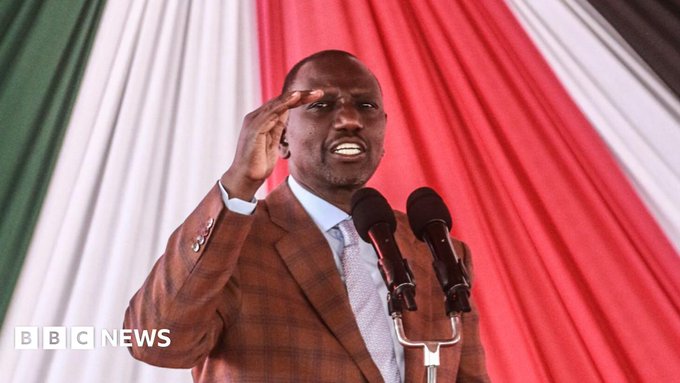
"I am not going to ask anyone for an apology for building a
church. The devil might be angry and can do what he wants."
At a meeting in State House
In this statement, the President of Kenya expresses marked
disdain toward critics of his decision to fund or support the
construction of a KSh 1.2 billion church project. By saying, "I
am not going to ask anyone for an apology for building a
church," he frames the debate as a moral or religious imperative
rather than a matter of public accountability, dismissing valid
economic or political concerns as irrelevant or even
blasphemous. His invocation of "the devil" as a metaphor for
dissenting voices is especially loaded, equating criticism with
evil, thereby vilifying concerned citizens or opposition
figures. Given Kenya’s current socio-economic struggles—soaring
public debt, tax hikes, youth unemployment, and widespread
protests against the cost of living—his tone appears not only
defensive but contemptuous of public sentiment. The statement
sidesteps the larger issue: the prioritization of massive
religious infrastructure amidst a financial crisis. Rather than
engaging with the frustrations of ordinary Kenyans, he presents
his actions as divinely justified and untouchable. This approach
further alienates a populace already feeling unheard and
overburdened. The disdain, therefore, lies in the flippant
dismissal of accountability and the framing of legitimate
economic grievances as spiritual opposition.
Source
Onesimus Kipchumba Murkomen, CS Interior
June 26, 2025
“na tumeambia polisi, mtu yeyote mwenye atakaribia police
station, piga yeye risasi.”
na tumeambia polisi, mtu yeyote mwenye atakaribia police
station, piga yeye risasi.
On June 26, 2025, during a visit to Harambee House in Nairobi
following the June 25 protests
By ordering police to “shoot anyone who comes near a police
station,” Interior CS Kipchumba Murkomen dangerously escalates
the state’s response to public dissent. This directive reframes
protest not as a constitutional right but as a security threat
deserving lethal force. By blurring the line between peaceful
protesters and armed attackers, it criminalizes mere proximity
to public institutions, effectively turning civic space into a
kill zone. Such rhetoric doesn’t just permit violence — it
legitimizes and normalizes it. When a senior government official
treats the presence of citizens as grounds for execution, it
undermines the rule of law and sets the stage for unchecked
abuse. It signals a broader state posture where public
criticism, resistance, or visibility near power can be met with
bullets, not accountability. Murkomen’s statement reflects a
disturbing trend in Kenya’s political climate: using militarized
language to suppress dissent. Just as calling critics “devils”
frames opposition as evil, shoot-to-kill orders recast protest
as enemy action. Both tactics erase democratic dialogue and
justify repression. In a democracy, state force must be
restrained, not unleashed. This directive reverses that logic,
treating citizens not as stakeholders in governance — but as
targets. It is an attack on constitutional order and democratic
accountability.
Source
Beatrice Adagala, Vihiga Women Representative
June 15, 2025
“Kama wewe hausupport President William Ruto basi wewe ni
shetani.”

““Nyinyi ni mashetani wenye ham support two terms za William
Ruto.” (“You are devils who do not support William Ruto’s two
terms.)”
This statement was made by Beatrice Adagala, the Vihiga County
Women’s Representative, during a public address supporting
President Ruto’s bid for a second term. Speaking at a local
rally (widely circulated via social media and The Kenya Times),
she labeled those who oppose Ruto’s re-election as "mashetani"
(devils)
By branding opponents as "devils," Beatrice Adagala effectively
demonizes political dissent, framing any opposition to President
Ruto’s two-term bid as inherently immoral and evil. This kind of
rhetoric shuts down democratic dialogue, deterring legitimate
debate by casting critics as malevolent actors rather than
engaged citizens. Furthermore, it risks deepening political
polarization, turning nuanced policy disagreements into a stark
spiritual battle and reducing complex governance issues to
binary, spiritualized conflict. Such language undermines
democratic norms, as equating dissent with evil erodes free
will, undermines respectful critique, and stifles critical
engagement in a healthy democracy. This pattern reflects broader
concerns about Kenyan leadership, where similar labels—such as
Ruto’s references to critics as “possessed by demons”—are
drawing alarm over the increasingly hostile language used in
political discourse .
Source
President William Ruto
June 15, 2025
Kurekebisha mambo lazima upite na watu kidogo ndio iwe
sawasawa.
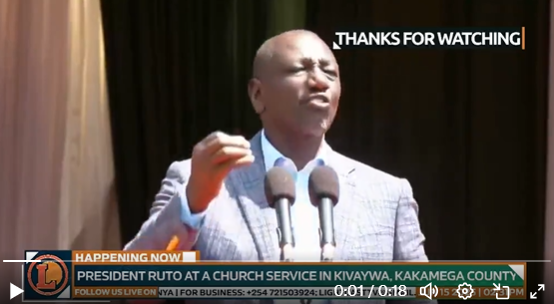
“na ilikua sio kazi rahisi, si mliskia iko makelele mingi, kwa
sababu unajua kurekebisha kitu iko na watu wamezoea maneno hapo
katikati lazima upita na hawa kidogo ndio mambo iende sawasawa
(laughs) ama niaje jameni, ehh...”
At a church service in Kivaywa, Kakamega county
President William Ruto’s remarks—“na ilikua sio kazi rahisi…
lazima upita na hawa kidogo ndio mambo iende sawasawa”—delivered
with a laugh following the killing of Albert Ojwang, reveal a
deeply unsettling tone of callousness and disregard. Framing the
death and the public unrest that followed as mere “noise”
(makelele), the president diminishes the seriousness of a young
man’s killing and the public grief it triggered. By stating that
“you must go through these ones a bit for things to run
smoothly,” he appears to rationalize or even justify coercive
action against dissenters, potentially implying that
disruption—including fatal force—is a necessary tool for
restoring order. The flippant laughter and rhetorical “ama niaje
jameni” reinforce the impression that the state views dissent
not only as inconvenient but expendable. In the context of a
citizen’s death allegedly at the hands of state actors, this
rhetoric reflects an alarming normalization of repression and a
refusal to take responsibility for violence against civilians.
Source
Karen Nyamu, Nominated Senator
Apr 2, 2025
We touched the mountain, and we are back to stick in the
finger
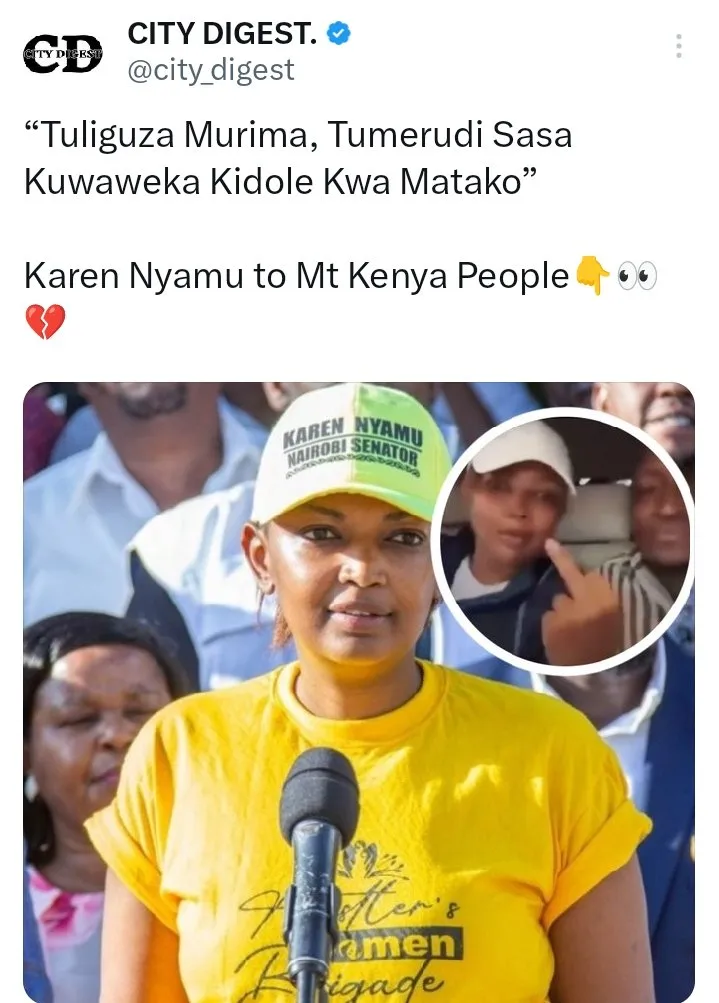
“twathie murima, murima nitwahutirie, turenda kumeikia *flashes
the middle finger*” Translated: We’ve gone to the mountain, we
touched the mountain, now we want to stick in the finger”
Inviting the public to the Mt. Kenya region in light of
President Ruto’s development tour.
Karen Nyamu’s statement, “Twathie murima, murima nitwahutirie,
turenda kumeikia,” which loosely translates to “We’ve gone to
the mountain, we touched the mountain, now we want to stick in
the finger,” is vulgar, disrespectful, and deeply unbecoming of
a public official. She is in the presence of MCA KURURIA
NJOROGE. The crude metaphor, especially in the political
context, suggests entitlement, arrogance, and a disturbing lack
of decorum. For a sitting senator to use such language in public
is a direct insult to the dignity of leadership and to the
citizens she serves. It reflects a worrying decline in the tone
and ethics of political discourse in Kenya.
Source
President William Ruto
Feb 6, 2025
Wajinga. Hamna PhD
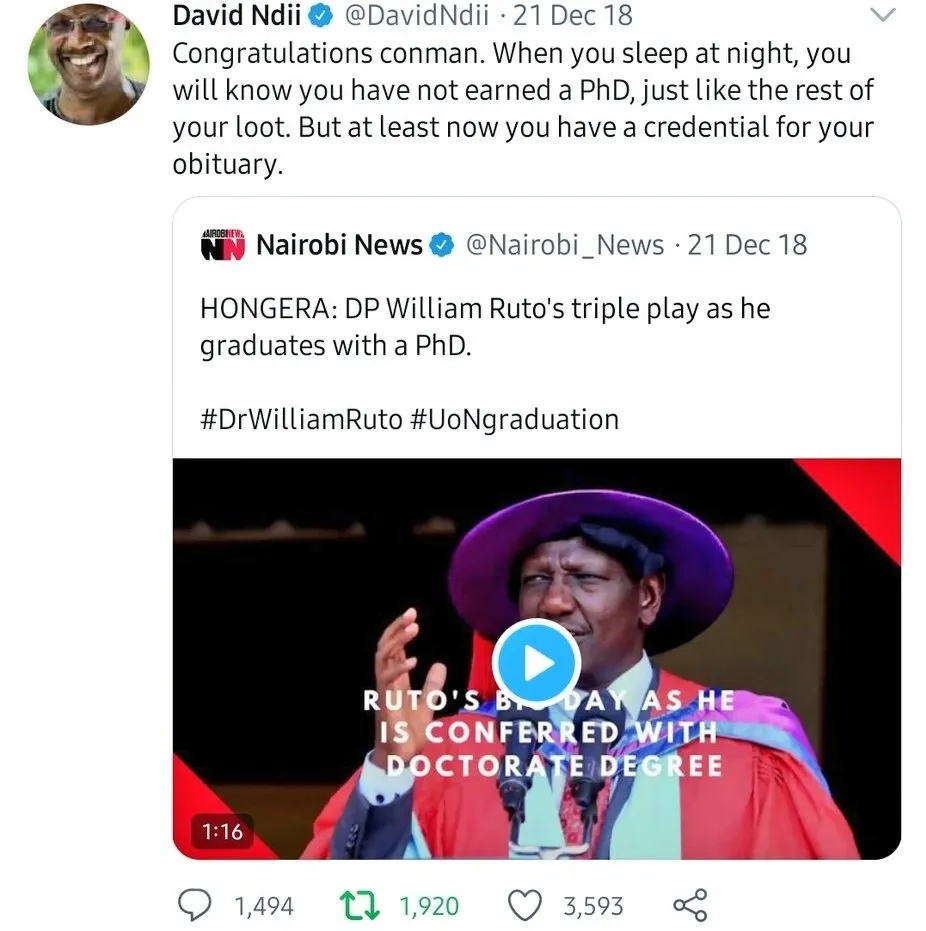
“Sasa kuna watu wengine wajinga wanatuambia tusichanje ng’ombe
yetu tusipate soko la kitaifa. Si hiyo ni ukumbafu? Si tumekuwa
tukichanja mifugo yetu tangu zamani?” ”Wewe unaenda kumsikiza
mtu ya kupanda ndengu. ati anakuambia usichanje ng’ombe yako.
yeye hana ng’ombe…hiyo ni mambo ya upumbavu na wakwende kabisa”
”Na mkiona wale wanalalamika ni watu sijui wamesomea wapi. Si
mimi niko na PhD…si mimi naelewa nini inaendelea Kenya? Sasa
mimi napata watu wako na elimu kidogo kidogo hapa wanajaribu
kunifundisha, mnanifundisha kazi gani?”
Garissa County as part of his Northern Kenya tour
President Ruto’s remarks are laced with arrogance,
condescension, and open contempt for critics of his livestock
vaccination program. Instead of addressing legitimate concerns
with facts and transparency, he resorts to insults, dismissing
those who question the vaccine as "foolish" and "ignorant." His
statement about having a PhD suggests that he believes his
academic credentials place him above scrutiny, reducing public
discourse to a show of ego rather than accountability. By
insulting Kenyans and belittling those with differing opinions,
he undermines the dignity of his office and further erodes
public trust in his leadership.
Source
Farah Maalim, MP
Jan 10, 2025
Washenzi, kumanina zenu
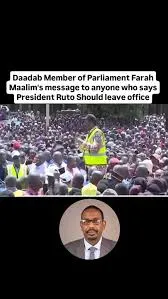
“Alafu washenzi wengine wanasema 'Kasongo Ruto Must go. Kumanina
zenu hao ambao wanaosema hivyo! Kweli anakaa kwa kiti ya mama
yako au baba yako? Amekaa kwa kiti yetu sisi, na tutamchagua
tutamrudisha…”
Kesses, Usain Gishu Last Mile Connectivity
Farah Maalim’s vulgar insults toward Kenyans are both
disrespectful and disgraceful. During the June 2024 Gen Z-led
protests, he had also suggested the killing of 5,000 protesters,
cementing his reputation for inflammatory rhetoric. That such
language was used in the president’s presence without any rebuke
suggests tacit approval, further eroding the dignity of
leadership. It is unacceptable for leaders to insult citizens or
threaten violence, especially when addressing legitimate
grievances. Respect and accountability should define leadership,
not vulgarity and intimidation.
Source
Mwangi Ichung'wa, MP
Dec 31, 2024
“Some hire Airbnb with their girlfriends and disappear for
three days and say they have been abducted”
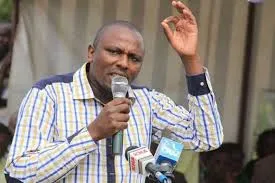
“They hurled teargas at themselves and then rushed to speak
about abductions and planned demos to replicate what happened on
June 25,” “Some hire Airbnb with their girlfriends and disappear
for three days and say they have been abducted” “There are even
elected leaders who are planning to go into hiding and claim
they have been abducted.”
End year thing
Mwangi Ichung'wah's claims that protestors were *locking
themselves in Airbnbs to fake abductions* and *teargassing
themselves* serve as a clear attempt to delegitimize genuine
dissent. His remarks came on December 31st, 2023, during a
period when five young men had reportedly been abducted, and
shortly after opposition leaders were tear-gassed in Nyandarua.
The timing and content of his statement not only trivialized
real fears of state repression but also implied that citizens
and leaders staging peaceful resistance were fabricating their
own suffering — a deeply dismissive and dangerous narrative from
a senior government figure.
Source
Mwangi Ichung'wa, MP
Dec 17, 2024
Huna mbuzi, huna ng'ombe na una nyamba maneno hayasaidii
mwanachi wa kawaida

Huna mbuzi, huna ng'ombe na una nyamba maneno hayasaidii
mwanachi wa kawaida
To cattle vaccination critics
Majority Leader Kimani Ichung’wah’s remark, "Huna mbuzi, huna
ng'ombe na una nyamba maneno hayasaidii mwananchi wa kawaida,"
dismisses critics of livestock vaccination in a derogatory and
unconstructive manner. This crass language, including references
to farts, is beneath a leader of his stature and distracts from
the core issue. Critics have raised concerns about the lack of
transparency regarding what the cattle are being vaccinated
against. Such dismissive rhetoric alienates the public and fails
to address valid questions about accountability and the
program’s intent.
Source
President William Ruto
Dec 17, 2024
“Kuna mtu amekosa kunyamba kwa sababu amekuwa vaccinated?
Spare us your ignorance”
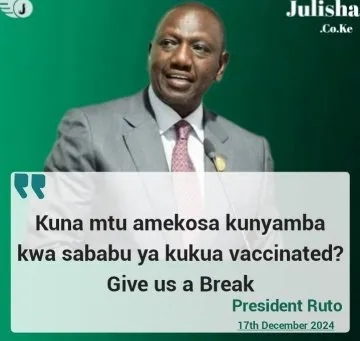
Watu wanasema ridiculous things. Eti ng’ombe akidungwa vaccine
atakosa kunyamba, sisi binadamu wenye tumechanjwa tumekosa
kunyamba?
Kuna mtu amekosa kunyamba kwa sababu amekuwa vaccinated? Spare
us your ignorance
President Ruto’s remarks about livestock vaccination and farts
are unbecoming of a head of state, reducing the dignity of his
powerful office. Instead of addressing critical questions about
the vaccine’s purpose, contents, and efficacy—especially given
its ties to Bill Gates’ emissions-reduction agenda—he resorts to
crude language and condescension. Such undignified behavior
shows a lack of manners and respect for the presidency, turning
a serious policy discussion into a mockery. Vaccination
campaigns are better suited for local administration, like
chiefs, rather than requiring direct involvement from the
president. This approach only deepens public skepticism,
undermines trust in leadership, and trivializes the pressing
concerns of citizens.
Source
Mwangi Ichung'wa, MP
Dec 11, 2024
“has never patronized an airport, does not even understand
the value of an international airport; not to an economy of
ours, but to the regional economy”
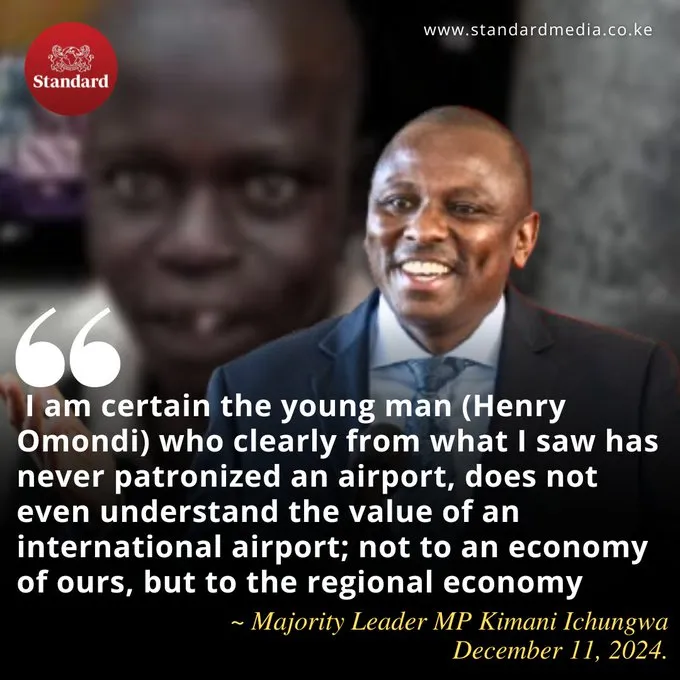
I am certain the young man (Henry Omondi) who clearly from what
I saw has never patronized an airport, does not even understand
the value of an international airport; not to an economy of
ours, but to the regional economy.
To Henry Omondi, a young Kenyan who during the GenZ-Led protests
was recorded vehemently opposing the JKIA Adani deal
MP Kimani Ichung’wah’s personal attack on Henry Omondi for
opposing the Adani deal is both discourteous and reprehensible.
Targeting an individual, especially someone vulnerable and
unable to retaliate, reflects cowardice and a lack of respect
for differing opinions. Criticizing Omondi’s economic
understanding instead of addressing the legitimate concerns
about the Adani deal undermines constructive dialogue. Leaders
should focus on defending policies with facts, not demeaning
citizens to stifle dissent.
Source
President William Ruto
Dec 10, 2024
"Mad, unreasonable, possibly stupid"
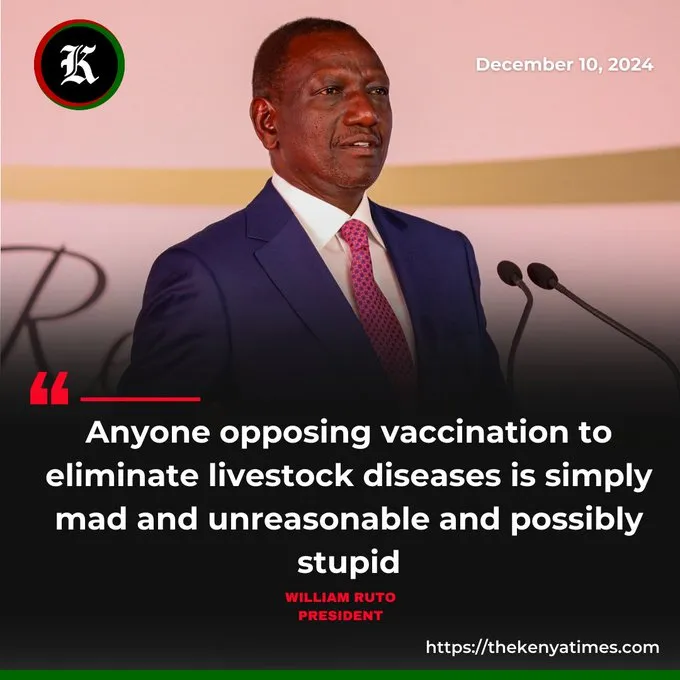
Anybody opposing vaccination to eliminate FMD and PPR is simply
mad and unreasonable and possibly stupid. Honestly, how else can
you explain? or may be they do not have cattle, may be they
don’t understand what this is all about.
Pastoralists summit in Wajir.
President Ruto's dismissal of critics as "mad, unreasonable, and
possibly stupid" for opposing the FMD and PPR vaccine reflects
his tendency to alienate dissenting voices instead of addressing
their concerns. His partnership with Bill Gates on the vaccine
has sparked skepticism, given its unpopularity and his
reputation for dishonesty. Such rhetoric not only fuels vaccine
hesitancy but also deepens public mistrust, undermining efforts
to promote health initiatives in a transparent and inclusive
manner.
Source
Oscar Sudi, MP
Dec 8, 2024
"Watu fake, watu jua kali tu"
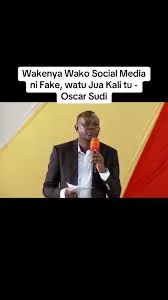
Msifuate ukora ya shosho media. Kwa sababu hii mtu ya shosho
media ni watu fake, watu juakali, hakuna kitu wanajua.
During a church service at AIC Pioneer in Eldoret on Sunday,
December 8, the MP dismissed critics of the Social Health
Authority (SHA) health cover terming them as fake people.
Oscar Sudi’s remarks dismissing critics as “fake know-it-alls”
and undermining legitimate grievances about SHIF/SHA reveal a
stark disconnect between leadership and the people. His party’s
promise to uplift hustlers contrasts sharply with his disdainful
tone toward juakali workers and critics. The failure of
SHIF/SHA, costing taxpayers 104 billion, justifies public
outcry, especially amidst widespread suffering due to inadequate
healthcare. Ironically, Sudi’s lack of parliamentary
contribution and display of wealth further erode his credibility
as a public servant.
Source
President William Ruto
Dec 3, 2024
"Mapepo"
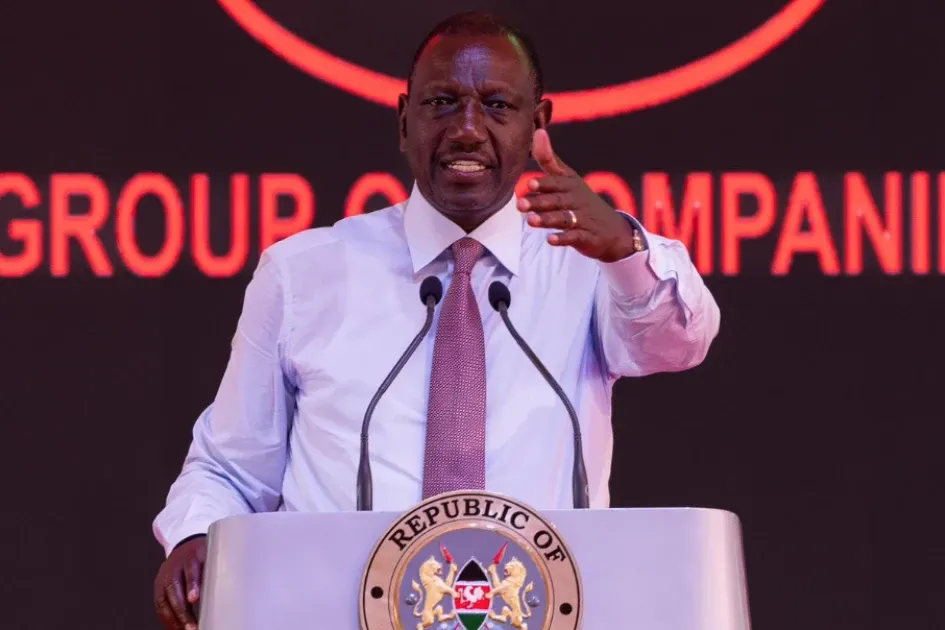
Wakenya tafadhali, kuna pepo chafu ya kupinga kila kitu. Kiwanda
kama hii, affordable housing, chanjo ya ng'ombe kuondoa
magonjwa, kubadilisha mfumo ndo tuweze kuokoa university zetu,
mambo ya afya wanaipinga. Nauliza hii pepo chafu. Imefika
wanapinga ata matoleo kanisani, what is this, surely. yani pepo
ya kupinga kila kitu
Groundbreaking ceremony for the Devki Iron Processing Project in
Taita Taveta County
The president's speech frames critics as inherently negative,
delegitimizing genuine concerns about his policies. By labeling
dissent as "pepo chafu," he undermines public discourse,
shifting focus from the real issues—such as detrimental economic
policies and lack of transparency—to moral judgments. This
rhetoric polarizes citizens and discourages constructive
critique, limiting accountability. It impacts public perception
by portraying opposition as anti-progress, which can stifle
debate on policies directly affecting livelihoods and national
welfare.
Source
President William Ruto
Dec 3, 2024
“Hamjawahi kanyanga uwanja wa ndege”

Wale wamesimamisha Adani kujenga JKIA hata hawajawahi kanyanga
uwanja wa ndege. What do you gain by stoping the building of an
airport in your own country?"
Groundbreaking ceremony for the Devki Iron Processing Project in
Taita Taveta County
President Ruto’s dismissal of Adani critics as people who "have
never stepped foot on airport land" reflects arrogance and
trivializes legitimate concerns over public asset privatization.
The controversial Adani deal, tied to corruption investigations,
raised red flags about transparency and the safeguarding of
public goods like JKIA and KETRACO. His rhetoric ignores the
gravity of these issues, framing critics as uninformed rather
than addressing the ethical implications. Such remarks undermine
public trust in leadership and democratic accountability.
Source
Francis Atwoli
Nov 27, 2024
"Poor"
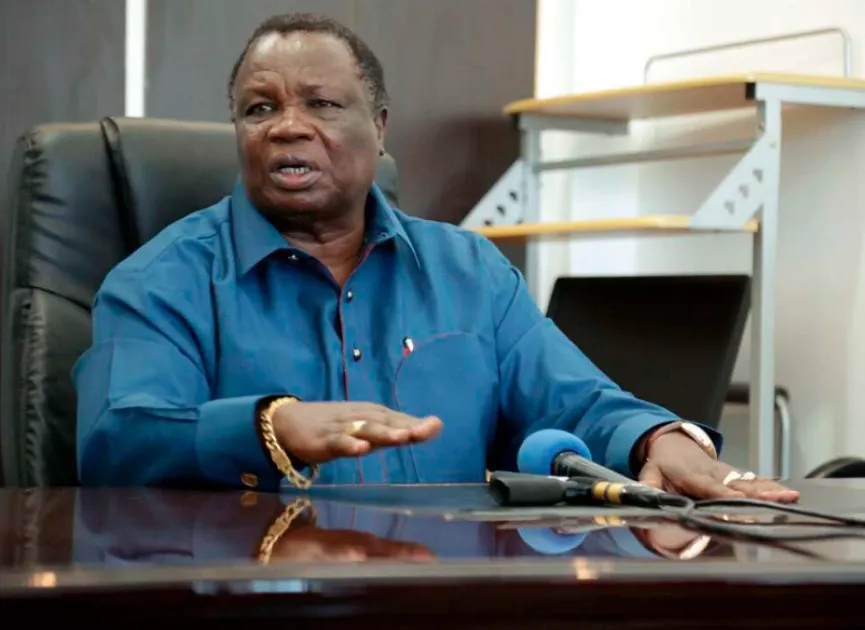
“If he came to me, I would tell him, let me see your budget. Are
you going to depend on well-wishers, or what do you have as a
person? Because when you are emerging for a political position,
you must have saved. The world over, nobody wants to be
associated with a poor person.”
Jeff Koinange Live, after Okiyah Omtatah announced his
exploratory committee towards his presidential bid on 2027
This statement by Francis Atwoli, the long-serving COTU
chairman, reflects the arrogance often exhibited by some leaders
towards ordinary Kenyans. By implying that poverty disqualifies
one from political ambition and associating success solely with
personal wealth, Atwoli not only disregards the systemic issues
that perpetuate poverty but also alienates a large portion of
the population he claims to represent. His remarks sparked a
wave of public backlash, with many declaring, "I am poor and I
support Okiyah Omtatah for president," as a form of defiance and
solidarity with leaders perceived as genuinely fighting for the
people. Atwoli’s rhetoric underscores the growing divide between
Kenya’s leadership and its citizens, amplifying calls for
accountability and inclusive representation.
Source
President William Ruto
Nov 10, 2024
"Sasa Wewe Mwanaume unakataa SHIF, utapata Mimba lini"
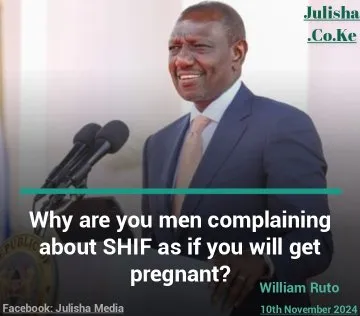
“Sasa Wewe Mwanaume unakataa SHIF, utapata Mimba lini'' Which
loosely translates to 'Why are you men opposed to SHIF and you
won't get Pregnant’
Kakamega
The president’s remark dismissing criticism of SHIF by implying
men shouldn’t care about maternity coverage reflects ignorance
and insensitivity. SHIF, meant to replace NHIF, promises
universal coverage, including outpatient and inpatient care for
all. However, widespread objections highlight its failure to
deliver, with maternity services reportedly worse than before.
His statement trivializes the broader impact of healthcare
issues, ignoring that pregnancy affects families and society at
large. Such rhetoric alienates critics instead of addressing
legitimate concerns.
Source
President William Ruto
June 25, 2024
"Treasonous Criminals"
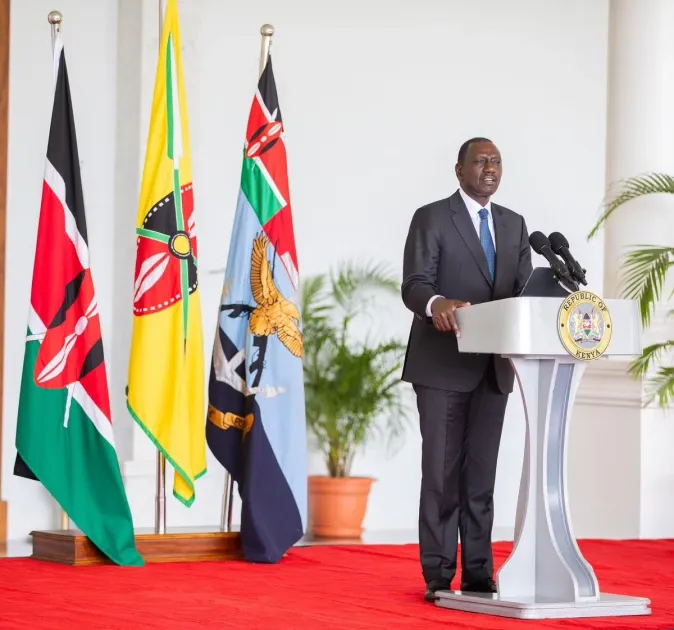
"I have directed all organs of our national security to deploy
measures to thwart any attempts by dangerous criminals to
undermine the security and stability of our country. As the
people of Kenya go to bed tonight, I give you my assurance that
the safety of your families and properties remains my utmost
priority.” "I hereby put on notice the planners, financiers,
orchestrators and abettors of violence and anarchy, that these
security infrastructures established to protect our republic and
its sovereignty, will be deployed to secure the country and
restore normalcy."
Address to the nation after Maandamano on 25th June 2024
The president's speech after the June 25 protests frames
peaceful protesters as "treasonous criminals," equating dissent
with threats to national security. This narrative stigmatizes
legitimate grievances, fostering fear and silencing opposition.
By portraying protesters as orchestrators of violence and
anarchy, the rhetoric justifies heavy-handed security measures,
undermining the right to peaceful assembly. Such language
escalates tension, delegitimizes civic participation, and erodes
public trust in government commitment to democratic freedoms.
David Ndii
June 14, 20234
"Digital Wankers"
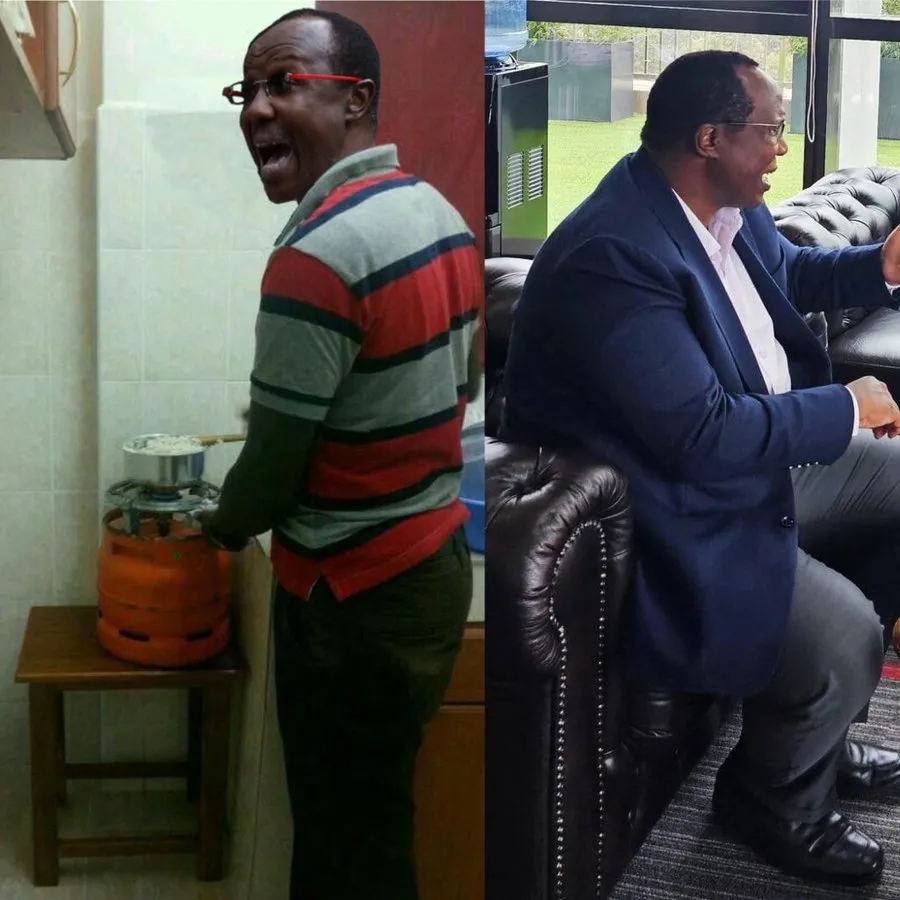
"1. Politics is a contact sport. Digital activism is just
wanking. 2. Any jackass can kick down a barn but it takes a good
carpenter to build one."
Before the GenZ-led Maandamano in June 2024
David Ndii’s dismissive remarks, labeling Kenyans on Twitter as
“digital wankers,” fueled public outrage by trivializing their
concerns and activism. This rhetoric not only alienated citizens
but also amplified frustrations, contributing to the momentum of
the largest protests ever seen. While his comments were not the
sole cause, they underscored a disconnect between leadership and
public sentiment, galvanizing people who felt dismissed and
disrespected to take their grievances from digital spaces to the
streets.
Ndii's Tweet
Submit New Entry
Insult Statistics
237
Total Insults Tracked
42
Officials Documented
68%
Aimed at Critics
53
High Severity Cases